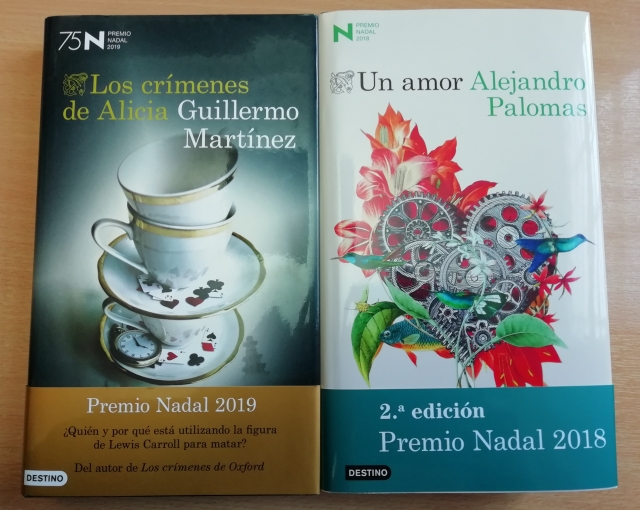The Premio Nadal is the oldest literary prize in Spain, awarded by Ediciones Destino (since 1988 part of Planeta group) to the best unpublished novel. We can find many important 20th century Spanish writers among their list of awardees. Four of them have won the Cervantes prize as well (see our post on Premio Cervantes).
 The prize is awarded every year on January 6. It was originally the idea of the journalist Ignacio Agustí, editor of the magazine Destino (belonging to the same publishing house) and best known for Mariona Rebull (743:01.d.17.285). The prize was created in order to discover new talent and provide a stimulus for literary creation in the post-war years. It was named after Eugenio Nadal, former editor of Destino, to honour the literature teacher who had then recently passed away at a young age.
The prize is awarded every year on January 6. It was originally the idea of the journalist Ignacio Agustí, editor of the magazine Destino (belonging to the same publishing house) and best known for Mariona Rebull (743:01.d.17.285). The prize was created in order to discover new talent and provide a stimulus for literary creation in the post-war years. It was named after Eugenio Nadal, former editor of Destino, to honour the literature teacher who had then recently passed away at a young age.
The prize was first given in 1944 to Nada (744:35.d.95.359), an existentialist novel by the young Carmen Laforet. Three years later, it was awarded to Miguel Delibes for La sombra del ciprés es alargada (744:35.d.95.300); he is a major figure in Spanish literature of the 20th century, who won the Cervantes prize in 1993.
In 1949, the Mexican-born writer José Suárez Carreño was the award-winner with Las últimas horas (9004.d.4372). After Laforet, the next female author to win the prize was Elena Quiroga (C216.c.4, 1950). Quiroga was the second female elected member of the Real Academia Española (1983), giving her inaugural discourse on the work of Álvaro Cunqueiro who won the Nadal in 1968 (744:35.c.95.281); and, like Quiroga, was from Galicia.

Dolores Medio won the prize in 1952 with her novel Nosotros los Rivero (9003.d.5411). It has been recently revealed that the original version suffered some cuts due to Francoist censorship. Three years after, Rafael Sánchez Ferlosio won the prize with El Jarama (744:35.d.200.7), his most well-known novel (he received the Cervantes prize in 2004). Two years later, Carmen Martín Gaite, another outstanding author from the Generation of ’50, who incidentally, married to Sánchez Ferlosio, won the prize for her novel Entre visillos (C200.d.1085). In 1959, Ana María Matute won with Primera memoria (744:35.d.95.295), she is the only female author who has received both the Nadal and the Cervantes prizes (she also was a member of the RAE).
Francisco García Pavón, received the prize in 1969 for Las hermanas coloradas (744:35.d.95.636), which is one of his successful detective novels. In 1975 Las ninfas (744:35.d.95.622) by Francisco Umbral was the prizewinner – this author and journalist was awarded the Cervantes prize in 2000.
Among the most significant (some of them very popular) authors alive who have won the prize, we can highlight:
 Fernando Arrabal, La torre herida por el rayo (744:39.c.95.8, 1982)
Fernando Arrabal, La torre herida por el rayo (744:39.c.95.8, 1982)- Juan José Millás, La soledad era esto (9000.d.4062, 1990)
- Rosa Regàs, Azul (744:39.c.95.294, 1994)
- Lucía Etxebarría, Beatriz y los cuerpos celestes (744:39.c.200.219, 1998)
- Lorenzo Silva, El alquimista impaciente (C203.c.355, 2000)
- Andrés Trapiello, Los amigos del crimen perfecto (C215.c.9772, 2003)
- Maruja Torres, Esperadme en el cielo (C204.c.2220, 2009)
- Alicia Giménez Barlett, Donde nadie te encuentre (C205.c.5913, 2011)
- Álvaro Pombo, El temor del héroe (C206.c.4366, 2012; member of RAE).
Most of the authors just listed above have also been awarded with the Planeta novel prize, which apart from being a prestigious award, is accompanied with a substantial financial reward.

The award winner in this 75th anniversary year is Los crímenes de Alicia (C215.c.8094) by the Argentinian novelist Guillermo Martínez, whose most popular book is Crímenes imperceptibles, later published under the title Los crímenes de Oxford (744:39.c.200.202). His winning novel was inspired by Lewis Carroll’s literary world.
Manuel del Campo

